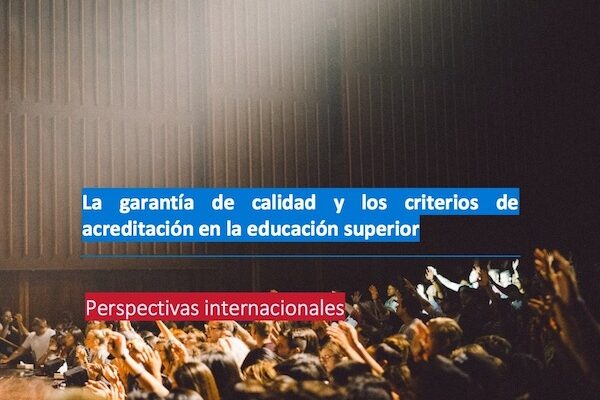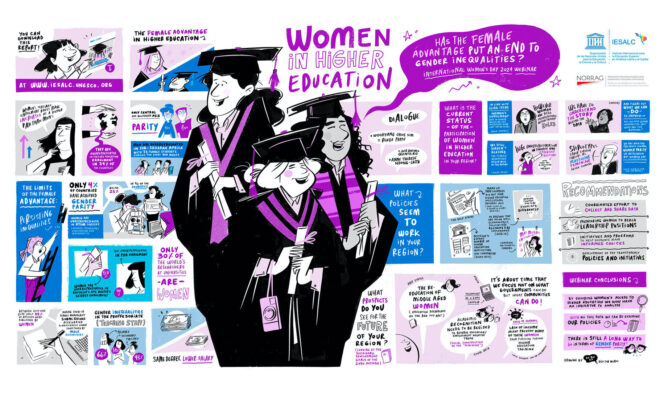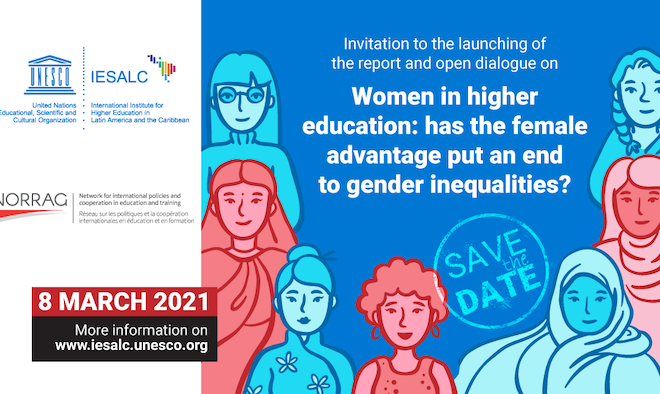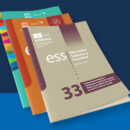IESALC launches study on quality and accreditation in higher education

On June 3, 2020, during the second session of the 2020 II Forum on Quality Assurance of Higher Education, the UNESCO International Institute of Higher Education for Latin America and the Caribbean, IESALC, presented the report Quality Assurance and Accreditation Criteria in Higher Education. International Perspectives, a study designed to accompany the process of national agendas regarding the quality of higher education carried out with the support of the Colombian Ministry of Education. “The quality assurance process is one of institutional transformation accompanied by innovation and focused on responding to the expectations of students, in connection with the context and with what the regions and the country require. (…) We thank IESALC for this comparative study. I think it gives us a framework to understand and contextualize the process that we have been carrying out over the past two years regarding the qualified register of high-quality assurance”, said the Colombian Minister of Education, María Victoria Angulo, in the words of welcome to the forum.
Focusing on accreditation processes of both institutions and higher education programs, the study examines the work of the ten quality assurance agencies in their political contexts, and identifies critical issues in accreditation processes, ranging from how to incorporate students’ academic achievements as a fundamental vector, to how to promote quality in the respect of diversity, not forgetting who should evaluate the agencies’ work and how to do so, as is indicated in the presentation.
Designed by Francesc Pedró, director of the IESALC, and developed with the contribution of Aliandra Barlete, researcher at the University of Cambridge, the paper addresses different meanings of quality assurance (QA), including “process of building confidence that the provision of education meets expectations or at least meets minimum standards”, in addition to establishing local benchmarks for the improvement of the HE system as a whole. “QA can also be a tool for self-regulation by increasing competition between institutions and programs, for example by establishing national rankings,” the authors say.
 Promoters and quality assurance strategies
Promoters and quality assurance strategies
The authors say that since the late 1980s, QA has been a key concern for States and has become a common strategy for HE policies. Some factors that have fostered it are: the massification of HE and the consequent increase in public spending, the New Public Management agenda, and internationalization (globalization), which has increased the need for internationally comparable and recognized titles, and a transparent evaluation system, which is an essential condition for comparability.
Quality assurance is expected to be part of the mandate of national governments. Citizens can legitimately expect the State to protect their rights, reflect the legitimate concerns of the public and bring them to the attention of providers, if necessary through external regulation. But institutional self-regulation also seems to emerge as a form of governance.
Another reason for this concern is the increase in the number of students, indicative of the need for institutions and programs to meet the demand, which may result in a proliferation of HEI that should be properly regulated in their diversity.
Impact of quality management in HE
Evidence in some countries shows that external QA has helped to establish new formal standards, for example the modularization of education in Germany, although the extent to which this has created a qualitative change may be debatable.
Sweden abandoned the measurements of the evaluation processes and focuses on the quality of the final thesis of the students, and has tried to create national degree exams, which point towards the direct measurement of the knowledge and skills of the students at the end of their studies.
In the United States, for example, the CLA and CLA + tests have been widely deployed to examine generic competencies, while in Mexico, the General Examinations for Graduate Studies (EGEL) are used by many institutions to evaluate graduates in specific disciplinary areas. In Colombia, all HE students are required to take a general proficiency test (Saber Pro) in order to graduate. The ENADE exam in Brazil is the only example of large-scale external exams that are compulsory for students and at the same time are used directly in the QA of programs and institutions.
In Argentina, the effect of CONEAU has been considered positive. In a group of institutions that went through the accreditation process with a case study in Engineering, the analysis indicated that, beyond establishing a quality standard, the policy generated continuous improvements to the accredited degrees. As a result, institutions were urged to review curricula, update teaching and learning methodologies, and to invest in new equipment and in the training of the staff.
Some lessons and recommendations emerge from the comparative analysis of this study: The first one is that in order to develop a quality culture for student teaching and learning, as well as to create conditions to guarantee and improve academic standards within HEI, the active participation of the leaders of an institution and academic staff are necessary.
The second lesson is that, to guarantee quality and accreditation, the processes to be evaluated must include: the design and approval of new course modules and study programs; procedures for reviewing academic programs; practices governing qualification and identification standards; procedures that influence the evaluation of teaching; procedures that affect student assessments; and other relevant components of the institution’s general processes to guarantee and improve academic standards.
The third lesson is that, in the opinion of academic staff, the most effective and legitimate instruments have methodologies with expert peer reviewers trained and supported during the review process by professional staff, and employ systematic and standardized procedures and protocols.
“One of the great challenges of unsolved quality assurance processes is cultural diversity. It is necessary to establish quality assurance mechanisms that look at how higher education institutions (HEI) are adjusting little by little. Today we realize that the most useful thing is to help each of the HEI to improve their quality. We cannot continue to rely on institutional standards. We have to go one step further, contextualizing the work of each institution and recognizing it in its diversity,” said Pedró during the closing of the forum.
Download the publication on quality assurance and accreditation criteria here
Photo Edwin Andrade – Creative Commons No known copyright restrictions.
RELATED ITEMS




